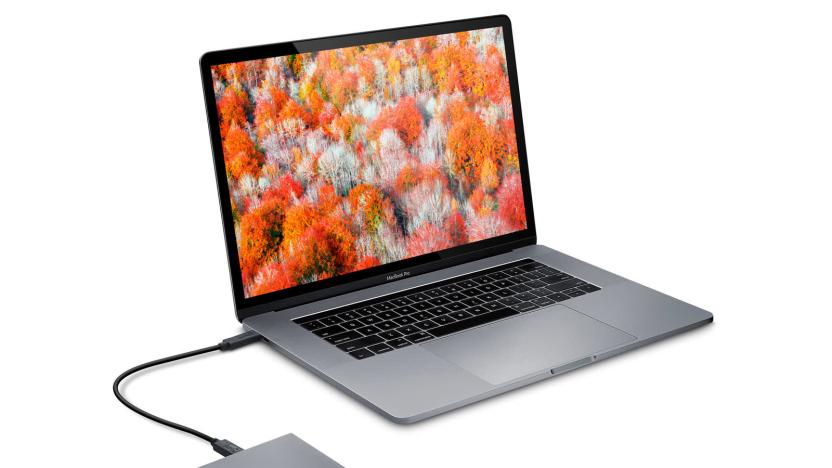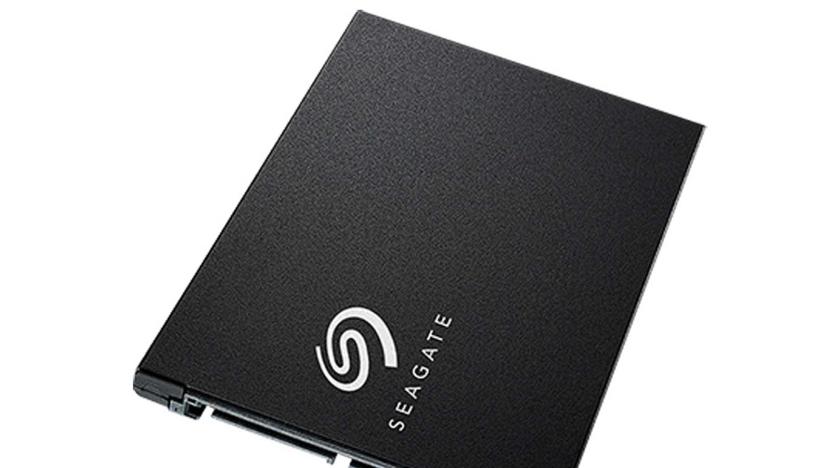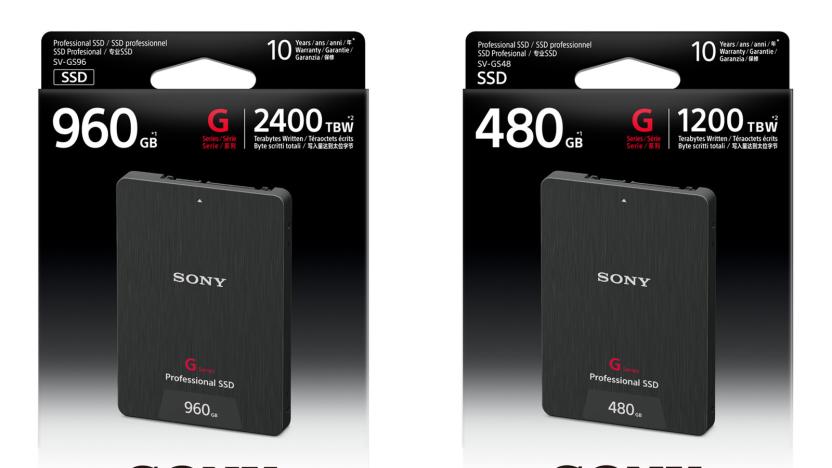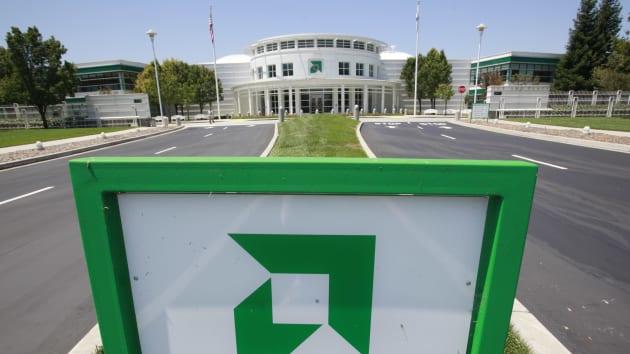solidstatedrive
Latest

LaCie's chiseled 5TB USB drive aims to make storage stylish
LaCie (and its parent Seagate) is still determined to inject some style into the world of external hard drives -- thankfully, with some improved functionality as well. Its 2019 Mobile Drive touts a chiseled-looking "diamond cut" metal design that wouldn't look out of place next to a MacBook Pro (you can still use it with Windows PCs, of course). The real allure, though, is the raw capacity -- you can opt for a 5TB version if you're editing gobs of media on the road, and even the slim version packs 2TB.

Samsung's 860 QVO brings multi-terabyte SSDs down to Earth
To date, buying a multi-terabyte solid-state drive has usually meant paying through the nose. It hasn't been uncommon to spend $1,000 or more to get a drive with capacity matching hard disks costing far less. That gap hasn't completely closed yet, but it's getting much narrower -- Samsung has unveiled its promised multi-terabyte SSD for the masses, the 860 QVO. The 2.5-inch SATA lineup uses quad-level cell (aka 4-bit) V-NAND memory to offer high capacities at prices that you wouldn't expect, at least not from a brand as big as Samsung.

Seagate courts PC enthusiasts with Barracuda SSD (update: pricing)
Seagate has offered SSDs for a while, but it's not what you'd call a strong supporter. Unless you're an enterprise user, you're typically either buying a hybrid drive or looking to one of the many alternatives. The company is determined to change its reputation, though: it just launched a Barracuda SSD built for PC enthusiasts. It's a relatively familiar-looking 2.5-inch SATA drive with sequential speeds up to 560MB/s and capacities ranging from 250GB to 2TB, so it won't compete with the NVMe drives that are all the rage as of late. However, the BarraCuda should be more than enough for a speedy boot drive.

Intel's SSD 545s has size and speed at an affordable price
It's not too hard to find inexpensive solid-state drives that offer either a lot of storage or brisk performance, but finding both? That's hard. Intel, however, thinks it has a chance. It's launching a budget 2.5-inch drive, the SSD 545s, that theoretically offers both high capacity and speed without straining your wallet. The key is the nature of the storage itself. This is the first shipping drive to use extra-dense 64-layer 3D flash storage, which lets Intel offer an abundance of space using relatively few chips (and thus a lower price) while maintaining performance. The 512GB debut model, for example, costs $180 brand new -- it's not the cheapest out of the gate, but street prices could make it very tempting.

Sony's SSDs can withstand the torture of capturing 4K
Aspiring 4K filmmakers who want the best quality can buy pro-level RAW video cameras on the cheap, or use a DSLR with an external 4K recorder like the Atomos Ninja 2. However, the SSDs on such devices often record and dump out high bit-rate 4K video multiple times a week, so they need to be much faster and more durable than the one on your laptop. That's where Sony comes in with its latest G Series Professional SSDs, which can write up to 2,400 terabytes without failing and use tech that prevents disastrous frame dropping.

Western Digital finally offers a consumer SSD
Western Digital has enjoyed a long run supplying data drives for all markets, but had stubbornly resisted releasing solid-state ones for consumers. This was an odd position back in 2008 when the technology began entering the mainstream and it's only become a more glaring omission in the interim. But today, WD is finally offering its first SATA SSDs for personal computers.

Samsung's new 512GB SSD is smaller than a postage stamp
Storage in your laptop or smartphone is a compromise between volume, access speed and physical size. But, the industry's competition to shrink them while boosting their specifications is fierce. A few months after shipping a 16TB solid-state drive, Samsung has announced a fast, efficient 512GB SSD that's half the size of a postage stamp.

Seagate will launch the 'fastest-ever' SSD this summer
Geeks of all stripes agree: there's no such thing as being able to move data too fast. Luckily for them, Seagate will soon show off a "production-ready" solid-state drive that push those bits like no one's business. That SSD -- which is expected to officially launch this summer -- can move data at up to 10GB per second, making the Samsung drive that last held the record seem pokey by comparison.

Samsung's new portable SSD puts 2TB in your pocket
Samsung ushered in last year by launching its first portable SSD, so it's only fitting the company should kick 2016 off by announcing a bigger, better successor. The new Portable SSD T3 is similar to the older T1 in more ways than one. It uses Samsung's reliable vertical NAND (V-NAND) memory, is capable of read/write speeds of up to 450 MB/s and though it's ever-so-slightly larger and heavier than the T1, the T3 is still tiny enough to get lost in a deep pocket. Arguably the most significant development is the jump in capacity, as the T3 will be available with either 250GB, 500GB, 1TB or a massive 2TB of storage.

Flash-based drives may soon be as cheap as the spinning kind
If you've noticed that solid-state drives (and the PCs that include them) no longer cost an arm and a leg, you're not alone. Researchers at DRAMeXchange understand that the price per gigabyte of an SSD has fallen off a cliff in the past three years, and the trend is only accelerating. If the company's estimates are on the mark, these drives could cost just 11 cents more per gig than conventional hard drives by 2017. At that rate, you might not have to choose between high capacity and breakneck speed when you're on a budget -- you could easily afford both.

SanDisk will help you switch to an SSD for $40
Looking to give your aging computer some new life? Swapping out the hard drive for a new SSD could do the trick, and if you're nervous completing the upgrade yourself SanDisk has a new service to lend a hand. The company's SSD Concierge Service offers live video support (via a mobile device, natch) so that folks of all skill levels are able to make the switch and improve speeds from the comforts of home. The service also includes "all of the tools required to upgrade their laptop successfully" including data migration and installation. If you're looking for some help giving your computer a refresh, SanDisk's virtual guidance can be purchased through Amazon and TigerDirect for $40.

Samsung shows off a 2.5-inch hard drive with 16TB of storage
Hard drives are as ubiquitous as the desktops or they're made for. But as technology evolves, manufacturers continue to make these faster and smaller than ever before. Case in point: Samsung, which has developed the world largest hard drive, packing 16TB of storage in a 2.5-inch format. While the PM1633a (as it's currently named) could be considered an SSD, since there aren't any moving parts inside, there's no doubt it is a good ol' hard drive at its core. The PM1633a, revealed during the Flash Memory Summit in California, is based on Samsung's NAND flash chips -- similar to what you'd find on the its consumer solid-state drives. There's no word on pricing or availability at the moment, but it is more than likely that the PM1633a will end being used for enterprise servers. Hey, we can dream, right?

Samsung brings 2TB solid-state drives to your home PC
You no longer have to bend over backwards to get more than a terabyte of fast, flash-based storage in your home computer. Samsung is shipping 2TB versions of its 850 Evo and 850 Pro solid-state drives, giving you as much capacity as a decent-sized spinning hard drive while maintaining that all-important SSD speed. They're only intended for desktops at the moment (they only use standard SATA connections), but Samsung is promising similarly cavernous models that are specifically designed for the mSATA and M.2 formats used in laptops. Just be prepared to pay dearly for these no-compromise drives right now -- the 'standard' 2TB 850 Evo is officially priced at $800, while the slightly faster, longer-lasting 850 Pro could easily break the bank at $1,000.

Samsung's first portable SSD packs fast storage for relatively little cash
You don't exactly have a ton of options when it comes to portable solid-state drives. You can get fast performance or high capacity at a halfway affordable price, but rarely both. Samsung thinks it can strike that tricky balance with its first-ever external option, the Portable SSD T1. The USB 3.0 storage is based on the same speedy-yet-cheap V-NAND chips as the 850 EVO drive you might buy for your gaming PC, letting it hold a large chunk of your files without devastating your wallet or slowing down -- it reads and writes at 450 MB/s, or just about desktop-level speeds. The line starts off modestly with a 250GB drive that costs $180, but you can opt for 500GB ($300) or 1TB ($600) if you have a lot of games or movies to carry around. That's still expensive compared to spinning hard disks, but it's a relative steal for the performance. Look for the T1 to hit US stores around mid-January.

IBM wants to kill the hard drive it invented
Saving files to memory is something that's supposed to be mostly invisible for the end user. We don't need to think about it; it just has to work. But whether it's a solid-state or hard disk drive, conventional storage solutions have their limitations -- namely, speed, rewritability and durability. A team at IBM Research's Almaden facility in California has a cure for all of that and it's called "racetrack memory."

AMD is preparing to enter the SSD business
With all the computing components AMD makes already, it's still hard to believe the company has yet to explore the solid-state drive space. But that's about to change soon -- it looks like AMD's finally ready to get into the business of making SSDs. Not surprisingly, the chip maker is bringing its new SSD line to market under the renowned Radeon R7 brand, perhaps hoping that becomes an incentive for potential customers. These solid-state drives, which AMD says are geared toward PC gamers, will be available in 120GB, 240GB and 480GB flavors, while the advertised read and write speeds appear to be on par with similar offerings from competitors like Samsung. Unfortunately, it's not easy to compare any further, since AMD won't be announcing the price of its Radeon R7 SSDs until they launch "later this year." [Image credit: Associated Press]

Plextor targets gamers with '50 percent faster' SSD starting at €199 ($275)
It's been more than a year since we last covered Plextor's wares, but the company's been busy with the next generation of its M-branded SSDs. For the first time, the range includes a premium PCIe option explicitly aimed at gamers, which promises much better speeds by side-stepping the SATA "bottleneck." This card, the M6e, starts at €199 ($275) for 128GB and tops out at €540 ($750) for 512GB, with claimed sequential reads/writes of up to 770/625 MB/s, and random reads/writes of up to 105k/100k IOPS. Plextor says that's a gain of around 50 percent compared to the sequential speeds you'd get from the regular SATA option, the M6S, but of course you're paying for that extra performance: The biggest 512GB M6S will set you back just €332 ($460), for example. We've been told to expect availability "very soon," but in the meantime you can check out some early reviews of the PCIe drive at the links below.

Samsung unveils not-so-entry-level SSD 840 EVO with up to 1TB of space
Disappointed that most entry-level solid-state drives are limited in capacity, speed or both? You'll be happy with Samsung's newly unveiled SSD 840 EVO, then. While it's badged as a starter model, the 2.5-inch SATA drive carries up to 1TB of storage, or twice as much as the regular SSD 840. Thanks to both 10nm-class flash memory and a multi-core MEX memory controller, the EVO range is also faster than you'd expect from the category. Depending on the model, sequential write speeds have doubled or tripled versus the original series, peaking at 520MB/s; the flagship 1TB edition can read at a similarly blistering 540MB/s. Samsung doesn't yet have US pricing for the SSD 840 EVO line, although it expects the drives to reach "major" markets worldwide by early August, with other regions coming later.

Samsung makes first PCIe-based SSD for Ultrabooks, we see one likely customer
Solid-state drives are so speedy these days that even a SATA interface might not have the bandwidth to cope. It's a good thing that Samsung has started mass-producing the first PCI Express-based SSDs for Ultrabooks, then. The new XP941 series uses PCIe's wider data path to read at nearly 1.4GB/s -- that's 2.5 times faster than the quickest SATA SSDs, and nimble enough to move 500GB in six minutes. It also ships in a tinier M.2 format that makes past card-based SSDs look gargantuan, even when there's up to 512GB of storage. Samsung hasn't named laptop makers receiving the XP941, although it doesn't take strong deductive skills to spot one of the (probable) first customers. When Apple is shipping a new 13-inch MacBook Air that just happens to use a very similar PCIe SSD from Samsung, there's likely more than coincidence at work.

Sandisk introduces Extreme II SSD, boasts 19nm tech and faster speeds
We haven't heard a peep about Sandisk's solid state drives since CES, so we perked our ears when the flash maker announced a new consumer SSD today. It's called the Extreme II, a SATA III SSD the company claims is fast and responsive enough to please gamers or just anyone hungering for a performance boost. Built with 19nm process and nCache technology, the Extreme II promises quicker boot-ups and faster runtimes. The hardware boasts up to 550MB/sec sequential read and 510MB/sec sequential write speeds, and up to 95,000 random read Input/Output Operations per Second (IOPS) and 78,000 random write IOPS. You can snag one now in 120GB, 240GB and 480GB capacities for $129.99, $229.99 and $439.99 each. Or you can save some cash and get something a little more budget-minded.









